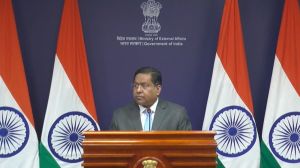Hu146;s navy
President Hu Jintao8217;s call last week for a rapid upgradation of Chinese naval power is certainly being noticed by military planners in New Delhi...

President Hu Jintao8217;s call last week for a rapid upgradation of Chinese naval power is certainly being noticed by military planners in New Delhi, Tokyo and Washington. 8220;We should strive to build a powerful navy that adapts to the needs of our military8217;s historical mission in this new century and at this new stage,8221; Hu said in comments reported in the Chinese official media.
Hu8217;s emphasis on battle-readiness and the ability to operate far from home shores would make the Chinese Navy a more familiar sight in and around the Indian Ocean.
As China rises to become a great power, its maritime interests too have grown. It is inevitable, then, China will seek to protect its sea-borne trade and growing volumes of energy import from abroad. Although its naval focus has traditionally been on preventing Taiwan from declaring independence, the Indian Ocean has emerged as an arena for greater Chinese naval activism.
India has been closely monitoring the expanding Chinese profile in the Indian Ocean, especially, its construction of ports and other maritime infrastructure in India8217;s South Asian neighbours, including Pakistan, Bangladesh, Myanmar, Sri Lanka and the Maldives.
India8217;s response, however, will soon have to focus on a more active promotion of regional maritime cooperation under its own leadership. This will necessarily involve a forward-looking naval strategy that leverages India8217;s diplomatic and commercial strengths in the Indian Ocean.
Singapore gets Gwadar
Every action, we know from Newton, begets an equal and opposite reaction. China8217;s expanding naval power has compelled countervailing moves including greater cooperation among the other actors in the region, including India, Japan, US, Australia, Singapore and Indonesia.
The biggest symbol of Chinese maritime strategy in the Indian Ocean has been the construction of a new deep sea port at Gwadar on Pakistan8217;s Makran coast and at the very mouth of the oil rich Persian Gulf. China had provided nearly 75 per cent of the US 300 million that cost the first phase of the port.
The surprising winner for the contract for Gwadar port operations has been Singapore8217;s PSA. It is believed that Pakistan was under considerable US pressure not to hand over the management of the port to the companies of the People8217;s Republic of China. Apparently Washington was not prepared to countenance Chinese strategic presence at a location of such vital interest to the US.
After awarding the contract to Singapore, Pakistani officials said PRC firms had not participated in the bidding for the Gwadar management contract. It appears that Pakistan Army had taken a conscious decision to 8220;depoliticise8221; the international concerns on Gwadar by offering it to non-controversial Singapore. New Delhi, too, should be pleased with friendly Singapore running the port.
Missile defence
The conventional political wisdom in New Delhi has been that China is opposed to missile defence programmes which seek to limit the effectiveness of a nuclear attack by intercepting the delivery systems. China, however, is now signaling a change of approach: If you can8217;t stop the US and Japan from developing missile defences, you might as well join them.
In its latest defence white paper, published last week, Beijing has signaled its plans to develop advanced air and missile defence systems. Reports from Pakistan also indicate that China is offering some of these systems to Islamabad.
That should make New Delhi look foolish for having rejected the US offer on missile defence cooperation when President George W. Bush visited to India last March. The UPA government was afraid the Communist parties would attack a deal with the US on missile defence. With Chinese communists embarking on missile defence, and India itself announcing a few weeks ago a successful missile defence test that involved some Israeli equipment, our Communists would hopefully begin to see the inevitability of military technological change.
- 01
- 02
- 03
- 04
- 05































